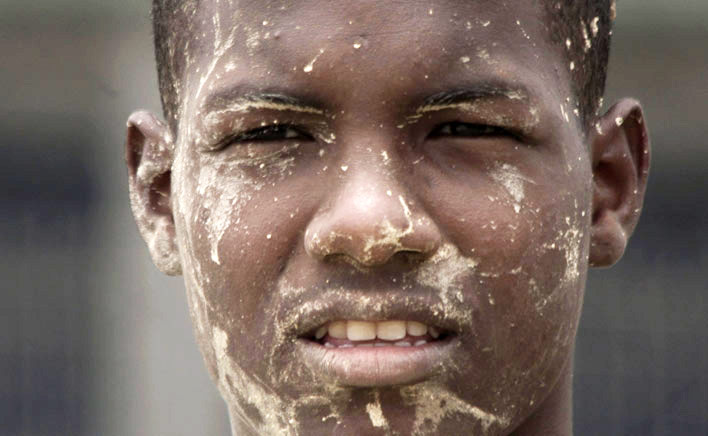
For better or for worse, any introductory text to Eryk Rocha’s work has to begin from his genealogical data: Eryk is the son of Glauber Rocha, the soul behind the Brazilian New Cinema and one of the helmsmen of the Latin American New Cinema and Third Cinema, and of the plastic artist, photographer, poet and filmmaker Paula Gaitán. He was born in 1978, during the shooting of Earth’s Age, which would be Glauber’s last film, early deceased in August 1981. It was with his mother, in Colombia, that he started to work in cinema, helping in her documentaries made for television and creating an experimental video group with friends. After Brazil and Colombia, Eryk lived in Cuba, where he studied cinema in the prestigious San Antonio de Los Baños film school, where he officially started his cinematographic career.
Performed in school context, the documentary Stone That Flies (2002) stets off his career after a good critic reception and a course that made him worth the selection in many international festivals, such as Locarno, Venice, Montreal and Havana, and prizes in CineSul and É tudo verdade (Brazil) and in Rosário Festival (Argentina). Once more, genealogy crosses with Eryk: Stone That Flies is born from a Glauber’s visit to Cuba in 1971 and concretely from two long interviews to Glauber about cinema and Latin American culture that Eryk found in the archives of Cuban Institute of Art and Cinematographic Industry (ICAIC). Glauber would be the protagonist again in New Cinema (2016), an impressive work about a group of critical young men made filmmakers that dreamt changing their country and the world with a recording camera. Even that the contact had been fleeting (his father passed away when he was only three years old), symbolically, father Glauber is present in what, until now, are the most significant projects of Eryk Rocha.
Since then, his career has been built up with more six feature films and two short films, collecting prestigious presences in many international festivals such as New York, Montevideo, Sundance, Guadalajara, Buenos Aires, Marselha, Amsterdam and Cannes, where he recently won the Gold Eye prize for best documentary with New Cinema. Presently, he’s preparing the shooting of his eighth feature film, Brief Mirages of Sun, a fiction.
In a recent interview, Eryk Rocha said that the directing of a project is not always “clear” or “rational” and that, as a filmmaker, he lets himself be seduced by “mystery” and a cathartic necessity to reflect and “say something that can’t be left unsaid”. The process is so complex that the Brazilian filmmaker believes that it isn’t the filmmaker that makes the film, but instead, that the film makes the filmmaker. His projects are born from a commitment, assumed or not, between parts and wills that are not always clear or consensual.
Respecting the precept “an idea in the head and a camera in the hand”, which intends to claim the importance of the content (idea) over the form (cinematographic technique, until then still a slave to the studio), the innovative way to move the camera or to move with it is maybe the material process that gets the closer to this will of surrounding oneself by reality, of promoting the spontaneous and the unforeseen, but also to this attitude of driving and being driven by the relationship between the camera and the faces and every other element that surrounds it. The camera is not only a vehicle to mechanically register what surrounds it, but essentially an extension of the body and the human mind that gives power to the experiences and emotions in permanent interaction with others.
In constant movement, the camera searches, above all, the poetic side, feeling and empowering it. In the same way, sound is a very important element in the Brazilian filmmaker films. The amplification, distortion, deceleration or acceleration are decisive effects to create rhythms and sensations, to feel and empower experiences and to take the spectator beyond the visible.
Consciously and deliberately, Eryk Rocha refuses, in his documental work, the conventional narratives, instead, he looks for a new form of sensorial and impulsive narration that explore the images and sounds textures and that play with his relationships, both of complicity and incompatibility. In his films, editing and mounting is a crucial moment in the creative process, a time of experimentation, manipulation and transformation, where images and sounds permanently construct and deconstruct the subjectivities and emotions that make the spectator vibrate. It is a mounting style very influenced by the aesthetics of the Russian school of attractions (from Kuleshov to Vertov or Eisenstein) and by the archeological style adopted by Godard in Histoire(s) Du Cinema, without forgetting the influence of Glauber Rocha himself.
In a clear way, we are not looking at a filmmaker that worries about the present mediatic space, which doesn’t mean any kind of alienation from social, political and cultural reality that marks the mediatic agenda. It is clear that, for example, Play Field is not a film about the 2014 Cup, but about something much more complex and thought-provoking that can be translated to “the Brazilian way of being”. The same happens in Clandestine Break, shot during a pre-electoral campaign, with the intent of analyzing the mediatic political reality of the country, but is much more complex than it appears. The filmmaker notes this mediatic moments and takes the opportunity to do a reflective and performative work about Brazil in all its mystic and tragical dimension.
Eryk Rocha is an accurate and meticulous image and sound archaeologist that has let himself be fascinated by the practical study of the cinematic forms, trying to reflect about the aesthetic and ethical transformations of cinema since the 60’s. The work with archive material, visual and sound, denounces that fascination and will to explore the long-time transformations, the evolutions of methods and the mutations of the individual and collective imaginary.